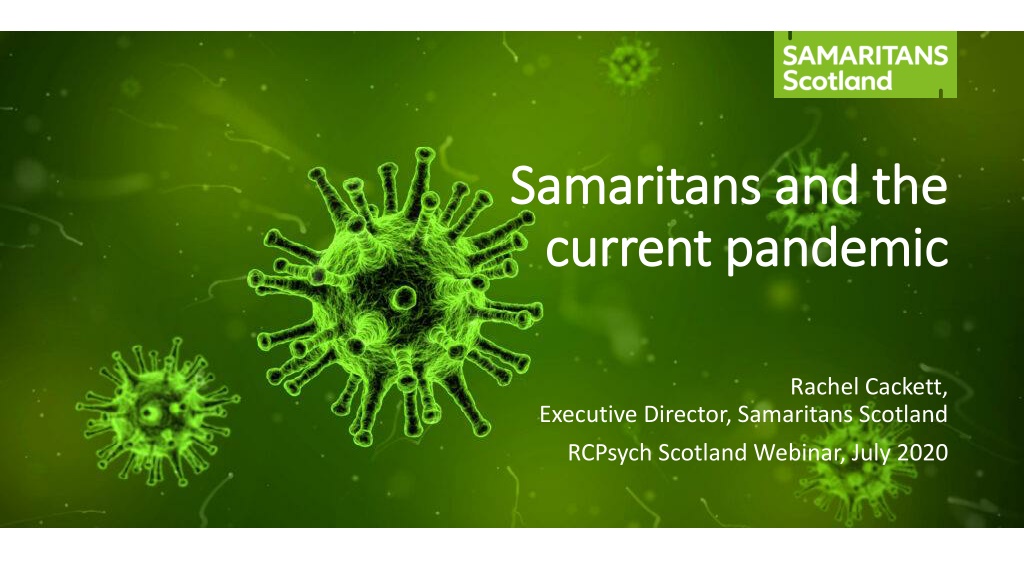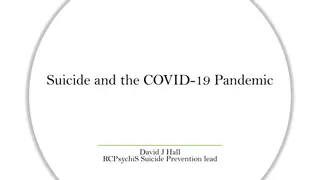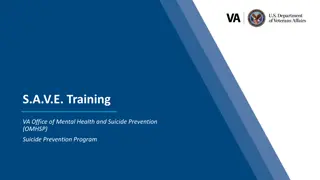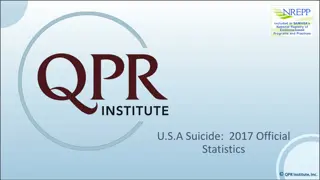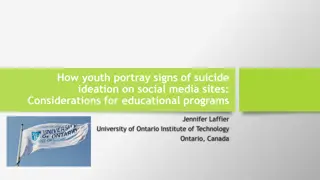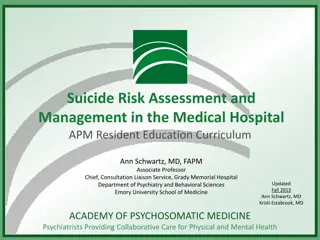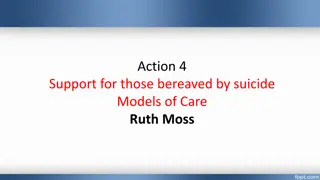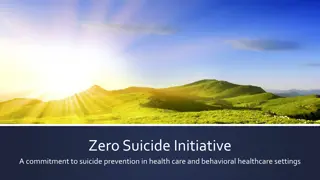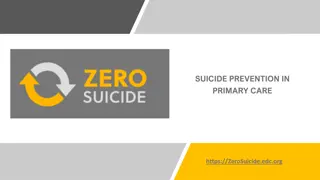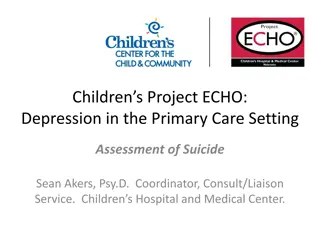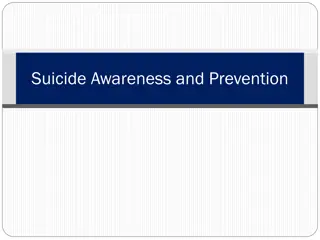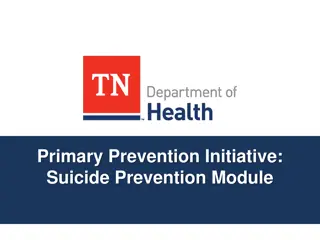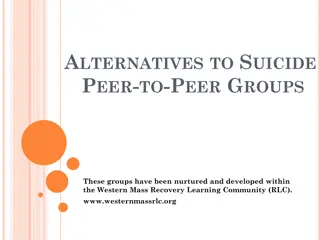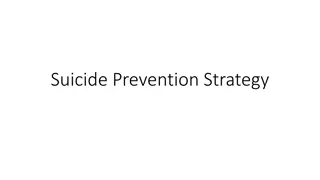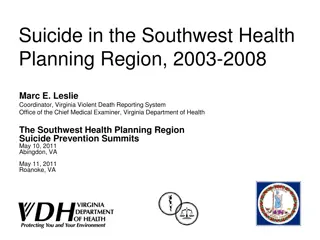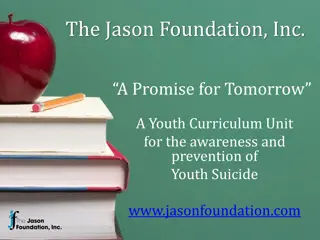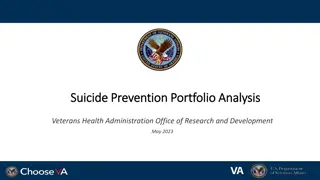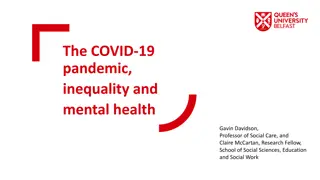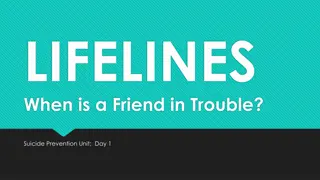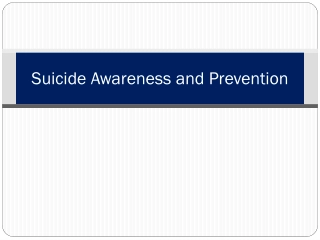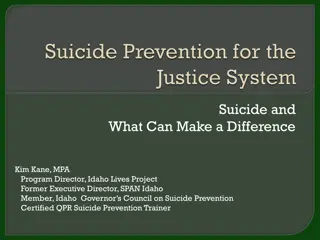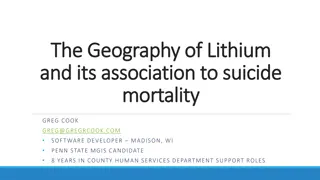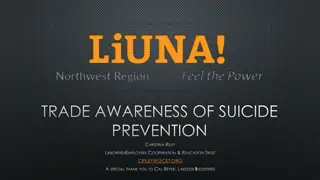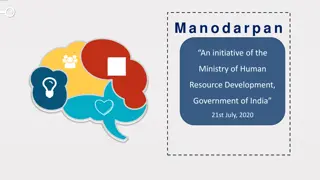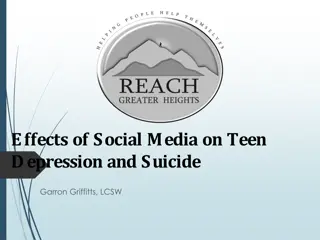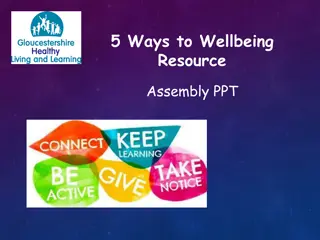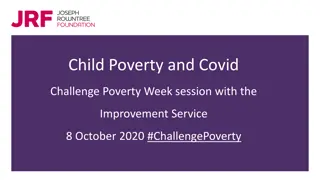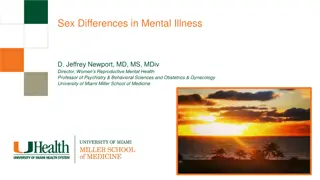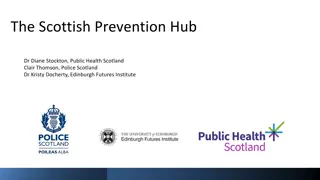Impact of the Current Pandemic on Mental Health and Suicide Rates in Scotland
Samaritans Scotland provides valuable insights into the effects of the current pandemic on mental health and suicidal thoughts among individuals. The service has observed an increase in anxiety and distress among callers, with a notable rise in first-time callers and those struggling to talk on the phone in private. Research indicates stable rates of suicidal thoughts and self-harm, emphasizing the heightened vulnerability of individuals with mental health conditions during lockdown.
Download Presentation

Please find below an Image/Link to download the presentation.
The content on the website is provided AS IS for your information and personal use only. It may not be sold, licensed, or shared on other websites without obtaining consent from the author. Download presentation by click this link. If you encounter any issues during the download, it is possible that the publisher has removed the file from their server.
E N D
Presentation Transcript
Samaritans and the Samaritans and the current pandemic current pandemic Rachel Cackett, Executive Director, Samaritans Scotland RCPsych Scotland Webinar, July 2020
Samaritans service in Scotland now Samaritans and the current pandemic Samaritans and the current pandemic Helpline. Free, 24/7 on 116 123 Email. jo@Samaritans.org Post. Chris, Freepost RSRB-KKBY-CYJK, PO Box 9090, Stirling FK8 2SA Prison Listening scheme App (https://www.samaritans.org/scotland/how-we-can-help/contact-samaritan/self-help/) Web resources (www.Samaritans.org) Webchat Face to face Outreach Key worker support
Samaritans and the current pandemic Samaritans and the current pandemic Samaritans Scotland: prevention
Research and Research and caller insights caller insights
Samaritans and the current pandemic Samaritans and the current pandemic Samaritans: service during COVID In the first thirteen weeks of lockdown, Samaritans provided emotional support nearly 645,000 times Our data suggests around 1 in 3 callers talk about COVID-19 however, volunteers suggest callers talk about it in almost all calls Volunteers tell us that callers are generally more anxious and more distressed than before the COVID-19 pandemic and that both have increased among callers as lockdown goes on. A few volunteers mention callers being more concerned about being overheard - some calls are ended abruptly. Suggest increase in email contacts because callers are finding it difficult to talk on the phone in private during lockdown Increase in first-time callers, people in prison, or people wanting human contact
Samaritans and the current pandemic Samaritans and the current pandemic What is the research telling us (suicide and self-harm)? Just over 1 in 10 adults reported experiencing suicidal thoughts during the first week of lockdown. Rates of suicidal thoughts have remained stable throughout lockdown, even as lockdown is being eased People with a mental health diagnosis have been 3 times more likely to have had suicidal thoughts in the past week, compared to people without a mental health diagnosis (33% vs 9%) 2% had self-harmed or attempted suicide during the first week of lockdown. Rates of self-harm have remained stable since then, between 2-3%, even as lockdown is being relaxed Since lockdown began, those with a diagnosed mental health condition have been approximately 3 times more likely to self-harm or attempt suicide compared to those without a mental health diagnosis (10% vs 3%). This pattern also continues to hold true as restrictions are being relaxed (Fancourt et al., 2020)
Samaritans and the current pandemic Samaritans and the current pandemic What are our callers telling us (suicide and self-harm)? Most volunteers suggest that callers are not any more or less suicidal than before the pandemic. Among callers who discuss suicide, feelings of isolation, anxiety and hopelessness come up frequently. But as the lockdown continues, feelings of entrapment come up too (e.g. not seeing the end to this ).
Samaritans and the current pandemic Samaritans and the current pandemic What is the research telling us (anxiety and loneliness)? During the first week of lockdown, almost half of the UK population experienced high levels of anxiety - twice as many people as late 2019 As lockdown is eased, fewer people (4 in 10) report feeling highly anxious, although this is still more than late 2019. Throughout lockdown, women have been 1.6 times more likely to report anxiety, while people who felt lonely were 3 times more likely to feel anxious 1 in 3 UK adults wellbeing was affected by feeling lonely in the first month of lockdown. In the same period, 50% of young people (aged 16 24) felt their wellbeing was affected by loneliness (ONS, 2020)
Samaritans and the current pandemic Samaritans and the current pandemic What are our callers telling us (anxiety and loneliness)? Volunteers tell us that callers are generally more anxious and more distressed than before the COVID-19 pandemic and that both have increased among callers as lockdown goes on Increase in frequency of conversations about isolation being exacerbated since the pandemic began . Callers seem more distressed about loneliness and isolation as lockdown goes on Certain groups more affected (e.g. older people). In second month of lockdown: increase in calls from young people concerned about separation from friends As rules relax some callers worry about new rules of interaction There has been an increase in calls where people just want to talk to someone
Samaritans and the current pandemic Samaritans and the current pandemic What is the research telling us? (relationships) In the first month of lockdown, Refuge has registered a 25% increase in helpline calls - a pattern seen internationally and in previous pandemics too (Chandan et al., 2020) In London, the number of domestic abuse incidents recorded by the Met Police between 9 March and 19 April increased by 9% on the same period in 2019 (Metropolitan Police, 2020)
Samaritans and the current pandemic Samaritans and the current pandemic What are our callers telling us? (relationships) Increase in frequency of conversations and heightened anxiety from callers about family; levelled off as lockdown goes on Month 1: many callers concerned about family members contracting COVID-19. Month 2: more callers worried about the financial impact of lockdown on their families, e.g. possible job loss affecting ability to support their family Many callers have been concerned about being separated from loved ones. Worries about vulnerable family members (especially older people) and the dilemma of wanting to care for and having to stay away Extended nature of lockdown has exacerbated household tensions As lockdown continues: increase in calls from young people frustrated at living with parents / parents reporting difficulties with home-schooling
Samaritans and the current pandemic Samaritans and the current pandemic What is the research telling us? (people with a MH diagnosis) People with a mental health diagnosis have consistently reported feeling more lonely compared to those without a mental health diagnosis (6.5% vs 4.5%), even as lockdown is being eased (Fancourt et al.. 2020) Three quarters (79%) of people with severe mental illnesses (such as schizophrenia or bipolar disorder) feel that their mental health got worse as a result of the pandemic. 42% of those people thought their mental health was worse because they were getting less support from NHS mental health services (Rethink Mental Illness, 2020). (Rethink Mental Illness, 2020)
Samaritans and the current pandemic Samaritans and the current pandemic What are our callers telling us? (people with existing MH conditions) Continued increase in frequency of conversations about callers existing mental health conditions being exacerbated and lack of access to MH support since the pandemic began Lack of access to mental health services (e.g. crisis teams, appointments) a major theme - causing callers increasing levels of distress. As lockdown eased, additional reports of insufficient and inadequate support. Samaritans used as an alternative by some callers. Callers appear to be increasingly distressed about their existing mental health problems being exacerbated, including depression, OCD and, in particular, anxiety. Many callers talk about loss of usual coping strategies and support networks. Some have struggled to introduce a routine; some sliding into old habits (e.g. alcohol use) or ruminating on unpleasant memories. In the first month of lockdown some callers spoke of positive changes in their mental health linked to a sense of all being in the same boat ; this seems to have dwindled as restrictions continue.
Samaritans and the current pandemic Samaritans and the current pandemic What is the research telling us? (finance) More than a third of 4,200 UK adults surveyed in the second month of lockdown, who were in full time work, were worried about losing their jobs. The same study shows that 1 in 5 unemployed people have felt hopeless and have had suicidal thoughts and feelings in the last two weeks (Mental Health Foundation, 2020) Unemployment benefit claims in the UK have increased to the highest level since 1996 and nearly a quarter of the workforce has been furloughed. The construction and entertainment sectors have been hit hardest, both with 40% of the workforce furloughed in the second two weeks of April (ONS,2020) In early May, a third of young people (18 24 year olds) lost their jobs or were furloughed nearly twice the rate of older workers (30 59 year olds) (Resolution Foundation, 2020)
What are our callers telling us? (finance) Increase in frequency of conversations and heightened anxieties about finance/unemployment at the beginning of lockdown appear to have stabilised as lockdown continues. In the first month of lockdown, callers worries were particularly focused on accessing essentials (e.g. food, medicine) and benefits. Since the pandemic began, many callers worried about losing their job / business / being furloughed. In the second month of lockdown, some volunteers reported an increase in calls from people for whom worries have materialised. Common themes: not being able pay rent/mortgage; financial help from the government not being enough, and fear of homelessness. As lockdown continues, some callers concerned about the pressure to go back to work when they don t feel safe to do so.
Adding to the research base Glasgow University, Samaritans, SAMH UK study involving around 3,000 people, who will be followed up throughout the pandemic to understand the ongoing impact Scottish Government commission: Glasgow University, Samaritans, SAMH Tracking the mental health of study participants for the next year, and providing a Scottish-specific insight into the impact of the pandemic and lockdown restrictions on the population Ongoing caller insights Continue to analyse caller data and volunteer insights
Responsible Responsible reporting reporting
Samaritans and the current pandemic Samaritans and the current pandemic What is social media telling us?
Samaritans and the current pandemic Samaritans and the current pandemic Samaritans media guidelines
Sponsorship of Sponsorship of NSPLG crisis NSPLG crisis workstream workstream
Samaritans and the current pandemic Samaritans and the current pandemic NSPLG: Suicidal Crisis Key priority for NSPLG Samaritans / Penumbra / RCGP Focus on point of suicidal crisis Expedited to give recommendations to shape post-COVID services Support from Academic Advisory Group Survey distributed Recommendations developed for autumn Priority also on better real time data Thoughts?
